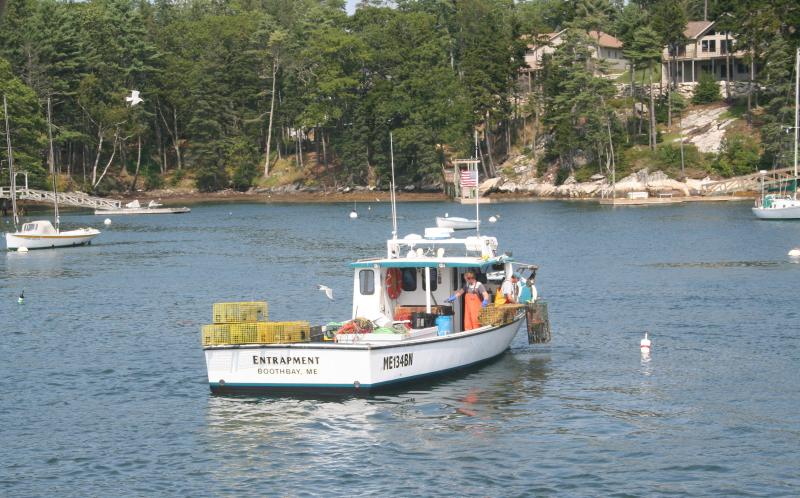The Maine Department of Marine Resources (DMR) has received two grants totaling $5,050,658 from the National Fish and Wildlife Foundation (NFWF). The funds will support research into alternatives to traditional lobster trap and buoy fishing gear which may be required by future regulations to reduce the risk of serious injury and mortality to endangered north Atlantic right whales (NARW).
“Alternative gear, also known as “on demand” gear is a long way from being viable for fishermen or for whales,” said DMR Commissioner Patrick Keliher. “It is my goal to make sure we know what gear works, and more importantly what doesn’t work, so when future draft federal regulations come forward, we can draw on the real-world experience of fishermen when determining what the next steps should be.”
One award of $1,999,992 will support the evaluation of acoustic geolocation systems that locate gear on the bottom without the benefit of surface buoys which are part of traditional gear configurations.
Acoustic geolocation technology uses sound to communicate between a boat at the surface and gear on the seafloor, allowing fishing vessels to see gear locations.
Fishermen participating in testing of geolocation technology, which will begin in 2024, will record data on the time spent locating gear, effective range of detection, and the relative effectiveness of the technology.
Information from the gear location technology testing will be shared with manufacturers to support product improvements and with regulators evaluating options for reduction of risk to whales.
A second award of $3,050,666 will support testing of technology that retrieves lobster traps from the bottom without the use of vertical lines. The program will involve the establishment of the Maine Innovative Gear Library (MIGL) to increase access to diverse alternative gear types, and an outreach program that engages fishermen in the research.
Gear will be loaned to commercial lobstermen who will integrate new gear into their existing operations. Regional “hubs” will be established to distribute gear, provide education and training on gear use, and to gather feedback on the operability of different gear types.
“Access to gear will familiarize fishermen with different available technologies and will provide an opportunity for fishermen to share feedback based on practical experience,” said Erin Summers, Director of DMR’s Division of Marine Mammal Research.
The program, which will also begin the spring of 2024, will involve a robust industry engagement program done in partnership with Maine-based organizations that have deep ties to the fishing industry and coastal communities. DMR will work with Maine Sea Grant to facilitate state-wide coordination of the program. Regional partners will include the Island Institute, Maine Center for Coastal Fisheries, Maine Coast Fishermen’s Association, the Sunrise County Economic Council, and the Gulf of Maine Lobster Foundation.
Support will be provided initially by DMR science staff and the appropriate regional hub through gear demonstrations and at-sea training on gear use and data collection. Fishermen participating in gear retrieval testing will have a chance to evaluate gear based on their interest and/or fishing operation. Testing will be done in a variety of locations along Maine’s coast to capture differences in regional environmental characteristics and fishing practices.
Data from the gear retrieval technology research will help regulators evaluate the amount of risk reduction the systems provide. The research will also help assess the cost, efficiency, and preference of fishermen for the different gear types.
The initial Maine Innovative Gear Library inventory has been made available for the program through an agreement with The Nature Conservancy, which has transferred ownership of over $100,000 worth of alternative gear to DMR as an in-kind donation to support the MIGL.
“We are happy our initial investment is helping Maine DMR launch the Innovative Gear Library,” said Geoffrey Smith, Marine Program Director for the Nature Conservancy in Maine. “Now this gear is readily available for those Maine fishermen who want to try it. We look forward to working with the Department to get it in the water to see how it works.”
Additional gear will be acquired and made available through the program as funding is available.































